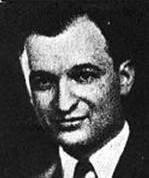A Quote by George Santayana
A body seriously out of equilibrium, either with itself or with its environment, perishes outright. Not so a mind. Madness and suffering can set themselves no limit.
Quote Topics
Related Quotes
One can think of a secretary actively operating a filing system, of a librarian actively cataloguing books, of a computer actively sorting out information. The mind however does not actively sort out information. The information sorts itself out and organises itself into patterns. The mind is passive. The mind only provides an opportunity for the information to behave in this way. The mind provides a special environment in which information can become self-organising. This special environment is a memory surface with special characteristics.
One wears one's mind out in study, and yet has more mind with which to study. One gives away one's heart in love and yet has more heart to give away. One perishes out of pity for a suffering world, and is stronger therefore. So, too, it is possible at one and the same time to hold on to life and let go.
The mind commands the body, and it obeys forthwith; the mind commands itself, and is resisted. The mind commands the hand to be moved, and such readiness is there that the command is scarce to be distinguished from the obedience. Yet the mind is mind, and the hand is body. The mind commands the mind to will, and yet, though it be itself, it obeyeth not. Whence this monstrous thing? and why is it?
The mind commands the body and is instantly obeyed. The mind commands itself and meets resistance. The mind commands the hand to move, and it so easy that one hardly distinguishes the order from its execution. Yet mind is mind and hand is body. The mind orders the mind to will. The recipient of the order is itself, yet it does not perform it.
The aim of the book is to set a limit to thought, or rather - not to thought, but to the expression of thoughts: for in order to be able to set a limit to thought, we should have to find both sides of the limit thinkable (i.e. we should have to be able to think what cannot be thought). It will therefore only be in language that the limit can be set, and what lies on the other side of the limit will simply be nonsense.
The end of the world: the wholesale internal introversion upon itself of the noosphere, which has simultaneously reached the uttermost limit of its complexity and its centrality . . . the overthrow of equilibrium, detaching the mind, furfilled at last, from its material matrix, so that it will henceforth rest with all its weight on God-Omega . . . critical point simultaneously of emergence and emersion, of maturation and evasion.
Pain is not the same as suffering. Left to itself, the body discharges pain spontaneously, letting go of it the moment that the underlying cause is healed. Suffering is pain that we hold on to. It comes from the mind’s mysterious instinct to believe that pain is good, or that it cannot be escaped, or that the person deserves it.
The majority of the diseases which the human family have been and still are suffering under, they have created by ignorance of their own organic health, and work perseveringly to tear themselves to pieces, and when broken down and debilitated in body and mind, send for the doctor and drug themselves to death.





































